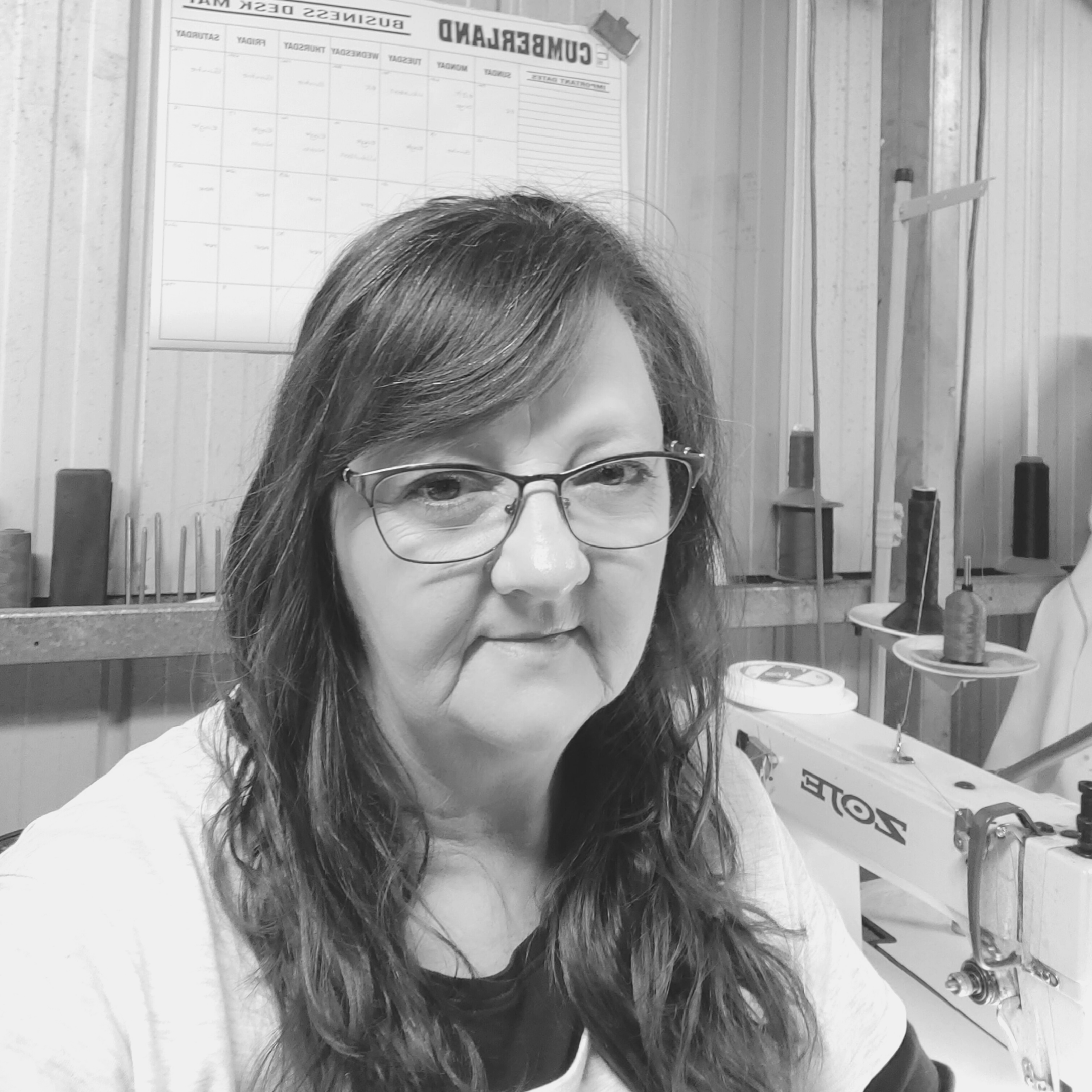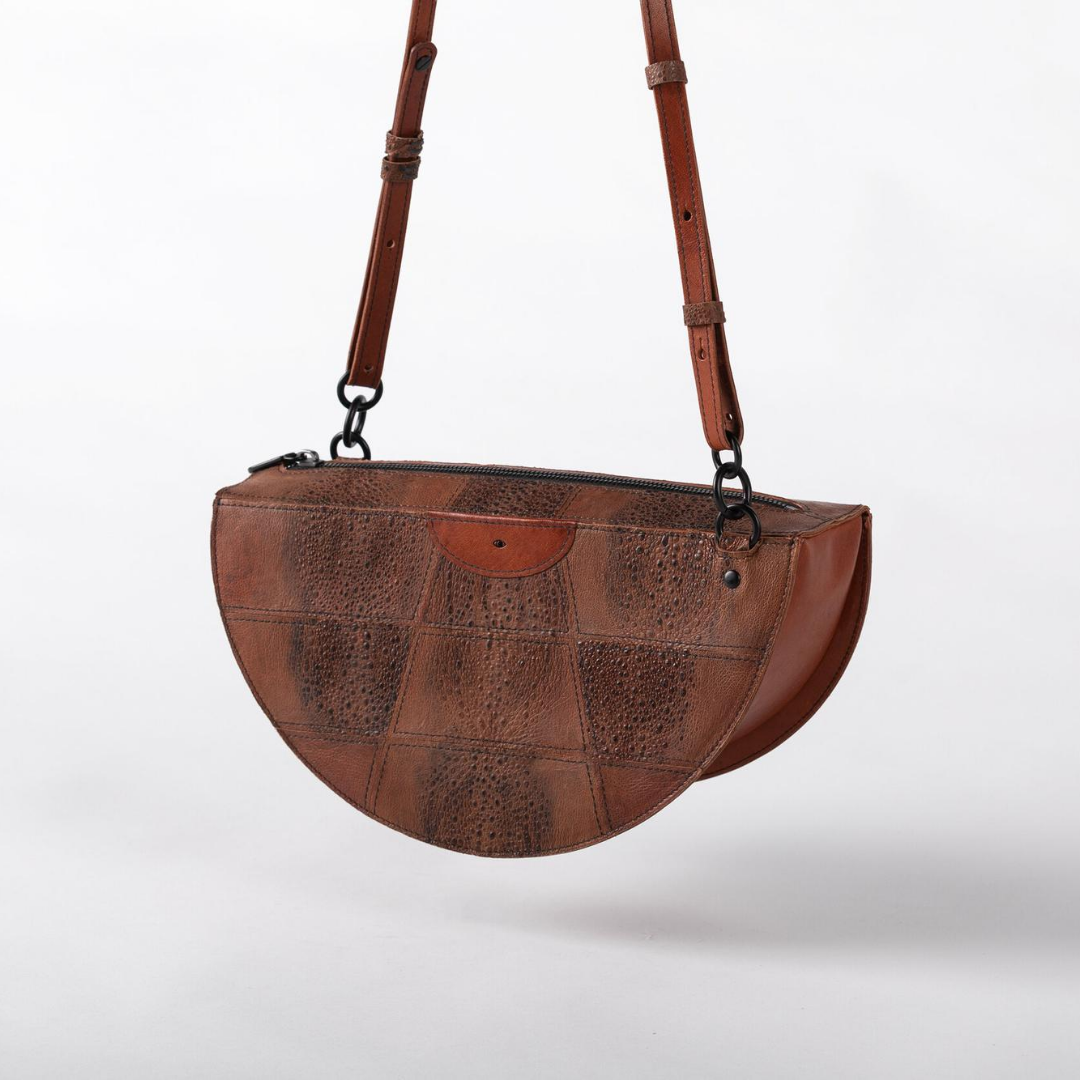our commitment to sustainability
To celebrate Plastic Free July (despite being a little bit late to the party), we are sharing our sourcing, manufacturing and packaging processes to reduce plastic waste and our overall environmental impact. For those who are inspired to reduce their own individual environmental impact, we have included some tips at the end.
We know we aren’t the perfect symbol of sustainability. To be frank, no fashion brand that creates new garments and accessories is. Understanding this, we are constantly striving to ensure our end-to-end processes are as sustainable as they can be.
We want to bring you along our sourcing and production journey, to transparently show you the sustainable and ethical processes that we currently undergo and what we are striving for in the future. 
Simone creating an xs crescent moon pouch in the studio.
Our process:
Our commitment to sustainability starts with the material components that make up each bag. We use natural materials such as kangaroo leather and organic hemp canvas to prevent plastic from entering our bodies and our environment. Whilst kangaroo leather is sourced locally, we must source our organic hemp from Qingdao, China as it isn’t being produced in Australia. Australia’s hemp farms aren’t producing plants that are mature enough to weave into fibers. As a brand, we look forward to the day when we can source our organic hemp canvas locally.
We have carefully selected our organic hemp canvas supplier, Hemp Fortex, as they hold sustainable and ethical practices at their core. Check out their website to showcase their end-to-end approach to sustainable fabric production.
Portuguese cork is used, instead of industry-standard plastic foam, to give the bag's shape and structure.
To minimise material wastage, all material scraps are saved and either donated or kept for our smaller products.
The only component that contains plastic is the thread that holds each bag together. The thread we use consists of 50% cotton and 50% polyester, which was chosen over all-natural alternatives that easily break under strain. In choosing this cotton and polyester blend, we ensure that each bag stands the test of time as a wardrobe staple instead of being sent to landfill years after it is purchased.
Our thread: 50% cotton and 50% polyester.
We aren’t choosing to be idle in our selection of threads as we are constantly on the lookout for sustainable material innovations that can help us eliminate the use of plastic entirely from our bags.
Our pledge to source and manufacture every simétrie piece in Australia ensures that the carbon footprint associated with freighting our product components is minimised.
When delivering each piece of simétrie to you, we use plastic-free and biodegradable packaging that wraps and protects each piece.
How we can all reduce our plastic wastage:
Feeling inspired to use less plastic in your everyday life? We have compiled a few tips on how you can reduce your plastic usage and carbon footprint:
Use plastic alternatives - swap out unnecessary plastics like glad wrap and zip-lock bags with reusable alternatives such as beeswax wraps from SisterWorks and these Silicone Fresh Food Pouches from Seed & Sprout.
 Hello! This is Imogen (a.k.a, the author of this blog and digital marketer at simétrie) and these are my Beeswax wraps!
Hello! This is Imogen (a.k.a, the author of this blog and digital marketer at simétrie) and these are my Beeswax wraps!
Bring nature into the bathroom - swap out plastic bathroom essentials such as toothbrushes and razors for bamboo and stainless steel alternatives. Opt for soap bars in cardboard packaging over liquid soap in plastic bottles.
Check out all of the eco-friendly and plastic-free bathroom alternatives at Seed & Sprout.
Shop local - you can purchase unpackaged produce at your local shop or farmers market. The added bonus is also that farmers keep more of the profit than they would at the big chain supermarkets, thus supporting Aussie farmers.
Need plastic-free bags to carry your produce in? Purchase some here from The Source.
Make & grow as much as you can - making the majority of your food and growing your herbs and vegetables is another great way to reduce our plastic usage. We are following the Green Hub’s guide to starting our own veggie garden. Learn more here.
Wear natural fibers and purchase from sustainable brands - plastic from our clothes can make its way into our environment and our bodies. Choosing clothing that consists predominantly of natural fibers is the best way to combat this. If you want to take it a step further, choose to buy from brands that incorporate sustainable practices into the entire supply chain and manufacturing processes. Here are some fashion and accessory brands that we know and love that hold sustainability at their core: Lois Hazel, Nobody Denim, Form by T, Aura Studios, Muse the Label and Holly Ryan.




Comments